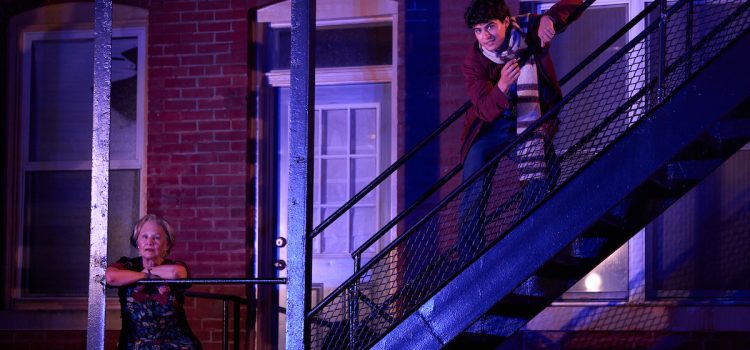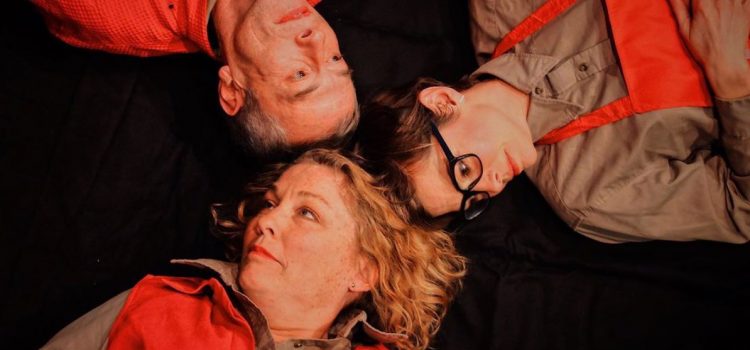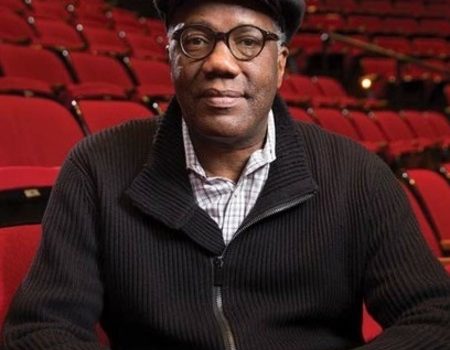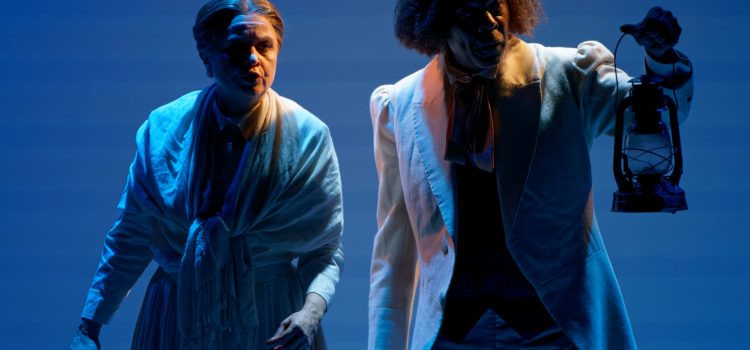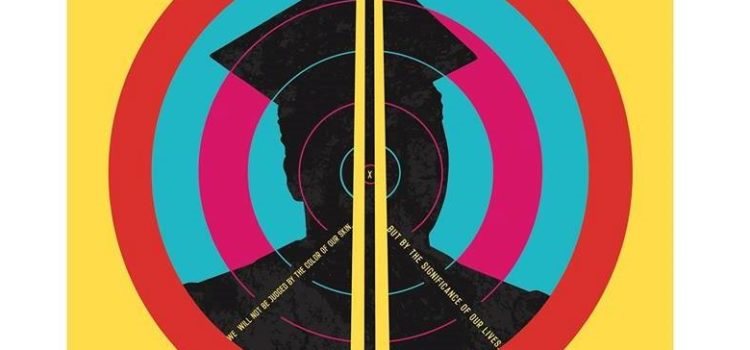By Lynn Venhaus
The stars have aligned for the triumphant return of the Tennessee Williams Festival St. Louis with “The Glass Menagerie” in a way you have never seen it before.
Nature cooperated with a bright, full moon in the late summer night sky Friday, and the TWF supplied the wishing and hoping that characterized the playwright during his formative years here.
Now in its sixth year, these special tributes are one I look forward to, a favorite-not-to-be-missed annual events in the city.
The passion and care that goes into each festival’s planning and programming is admirable. And the finest talent comes together to introduce us to, or offer a fresh perspective of, his signature dramas and little-known works.
To understand Williams’ dreams and desires has fueled each production, but this one – his memory play that gives us insight into his family life – is extraordinary.
The fest’s 2021 theme, “The Moon and Beyond,” aptly fits in a pandemic-guided scaled-down event. And this focus gives us an intimate local view that zeroes in on what we should see, hear and feel when we see a Williams play.
Nearly eighty years later where it was imagined, this current presentation of “The Glass Menagerie” is as organic as you will find anywhere, with naturally gifted performers honoring these four characters with a tangible vitality.
There is a brightness, a vigor to the work, as if we are discovering it for the first time. The site-specific location, outdoors behind “The Tennessee,” at 4663 Westminster Place, no doubt played a part in this, for it has become a character, a presence affecting the poignancy.
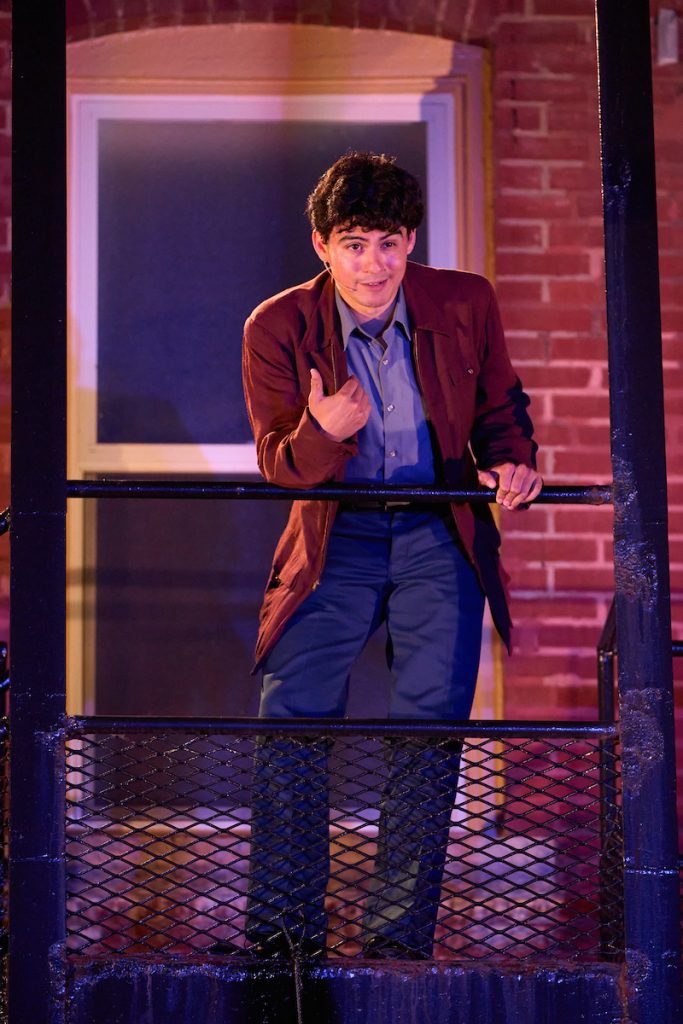
But that’s not the only imprimatur.
A young man yearning for adventure looks up at the moon while he’s out on his fire escape in St. Louis, hopeful that one day he would lead the life he dreamt of – but fretful that it would never happen unless he took steps to make it so.
From the time he was 7, Thomas Lanier Williams III lived in an apartment in the Central West End with his shoe company executive father, his Southern belle mother, his mentally fragile older sister and his younger brother Dakin, who later lived in Collinsville, Ill., for many years, and died at age 89 in 2008.
Nicknamed “Tennessee,” Williams eventually took pen to paper, and typed out stories of longing and aspirations, shaping characters from damaged people whose life didn’t turn out like they had planned.
And his stubborn refusal to not accept the status quo or to settle because that’s just the way it is, people kept reminding him – well, that admirable quality served him well.
He would go on many voyages – bur always starting from inside his heart.
What fiction he wrote would take him far, becoming known internationally as one of the world’s greatest playwrights. But here, he struggled to find his voice — returning from college at Mizzou to work at the shoe factory, and 20 years after moving from Mississippi, finally getting out of the city (until buried in Calvary Cemetery after his death in 1983).
He was impacted by his dysfunctional family, and realizing he was an outsider looking in –that hunger to be someone, and to become comfortable in his own skin, drove him during his 71 years.
All of that is apparent in “The Glass Menagerie.”
Knowing that he was fueled by a hope that could not be quelled and a fire that burned inside him to tell stories from a city neighborhood lends both a magical quality and a gravitas to the latest production.
The cast found the truth — Bradley James Tejeda as Tom, Brenda Currin as Amanda, Elizabeth Teeter as Laura and Chauncy Thomas as the Gentleman Caller Jim. All but Thomas reprised their roles from the radio play last fall, directed by Brian Hohlfeld during the “Something Spoken” streaming offering instead of live theater — (ahem, public health crisis you may recall, so they pivoted).
In most productions, the women are portrayed as victims, and their tragic life circumstances influence its staging.
However, director Hohlfeld, who has been part of the TWF since its inaugural year in 2016, has brought out every character’s depth, and so have the actors, who found a rhythm in the words and with each other.
I have previously seen a few dour versions, most of them not very good because they didn’t seem to grasp the multi-faceted nature and emphasized only the melancholy. This cast “gets it.”
The lines are delivered in a conversational manner, and a real bond can be felt between these inextricably linked people, no matter how unhappy or frustrated they appear.
The sad and desperate Amanda clings to her delusions of grandeur like a warm coat, mired in the past and overly concerned about her children’s future. Currin captures all of that, as well as the exasperation with life and her breadwinner son and helpless daughter having notions of their own.
Each character has a different viewpoint on success.
With his literary illusions, Tom can’t seem to find his way – but is about to take a leap of faith. Tejeda brings a restlessness to the role, like he is a trapped animal. But there is also a sweetness in his interactions with his sister.
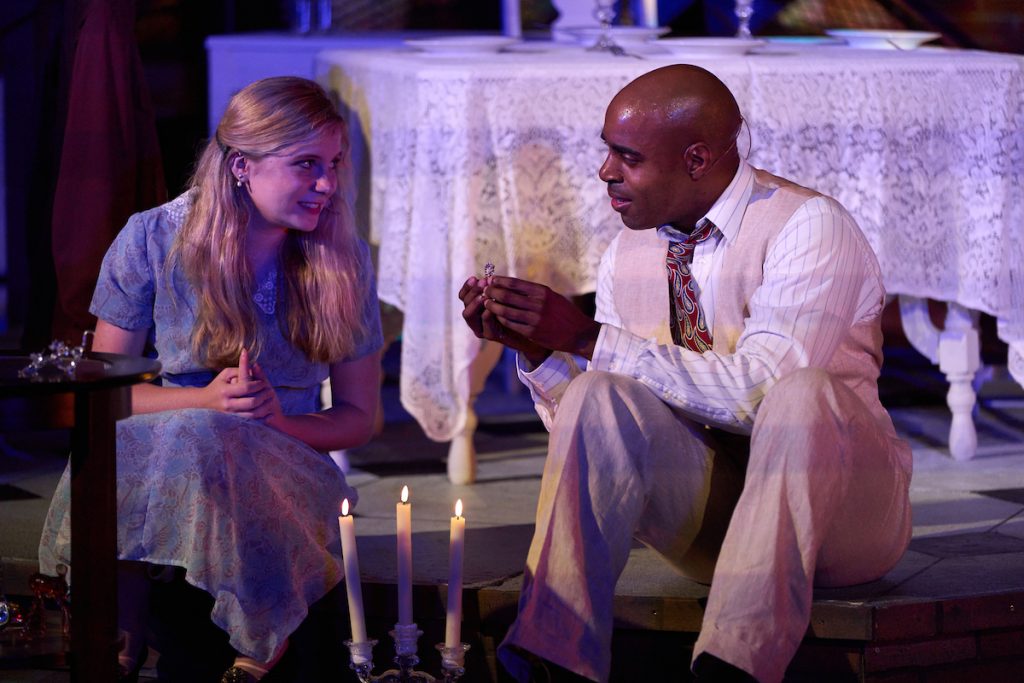
Thomas’ inherent charm adds a palpable compassion to the dinner guest, never pitying Laura but treating her kindly and with respect. He adds a wistfulness to Jim, who is past his high school glory days.
Teeter disappears into the delicate Laura, whose fantasy world is overtaking a daily string of disappointments. She will break your heart as a shy and peculiar girl who couldn’t overcome life’s challenge, but who lights up in conversation with Jim.
When the play premiered on Broadway in 1944, expanding on Williams’ short story “Portrait of a Girl in Glass,” director Elia Kazan noted: “Everything in his life is in his plays, and everything in his plays is in his life.”
And we have been enriched by that authenticity.
Staged outdoors, the set, designed by Dunsi Dai, is minimal, but evocative of the area. He effectively uses windows as an entry to the soul.
The sound design by Kareem Deanes includes period songs played on a victrola – and dealing with the inescapable sounds of the city, including a fire truck and sirens Friday night (Bravo, Chauncy, for not missing a beat).
Lighting designer Catherine Adams shifts between day and night, under serious moonlight, enhancing the atmosphere.
Williams spent his life trying to escape the ghosts of his past, which of course molded him into what he became. By now, the Wingfields are an all-too-familiar American tale tinged in tragedy and regret, but the power of his words remains.
He ultimately discovered, through his artistry, that he wasn’t the only lost star, and the eloquence of his semi-autobiographical work shines through in the backyard that he once called home.
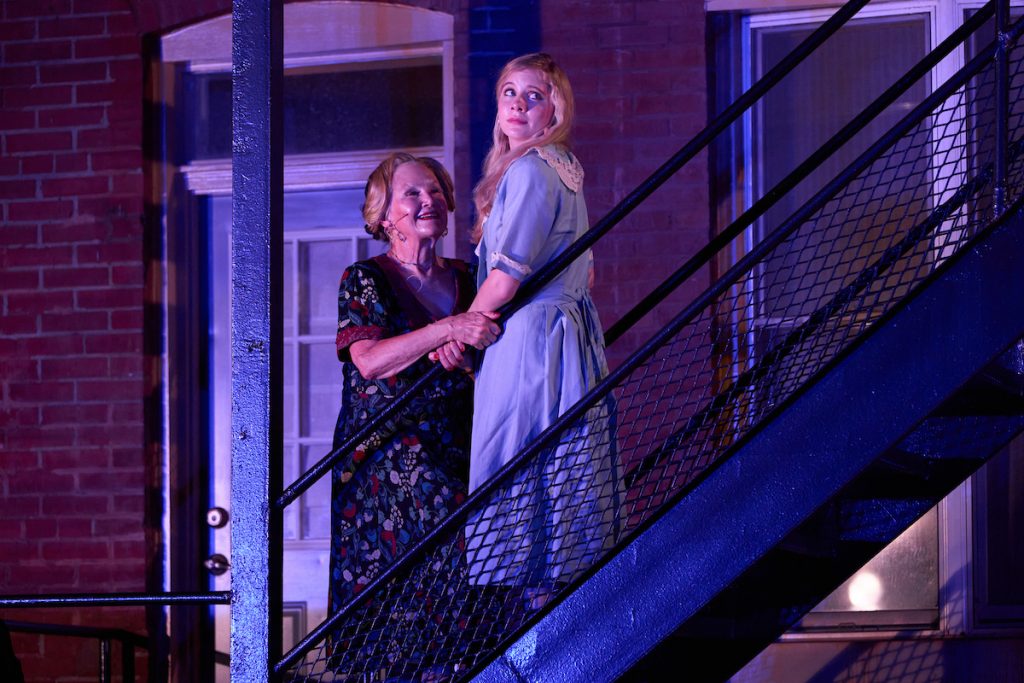
The Tennessee Williams Festival runs Aug. 19-29. The headliner, “The Glass Menagerie,” is presented at 8 p.m. Thursday through Sundays, Aug. 19-22 and 26-29, behind the Tennessee, 4663 Westminster Place. Tickets must be purchased online and are available through MetroTix.com.
“You Lied to Me About Centralia” is a one-act play by John Guare that will be presented at 2 p.m. on Aug. 21 and 22 at The Tennessee.
Free, secure parking is available at Holliday, 4600 Olive, for festival patrons.
Other festival programming includes Scholars’ Panels, Walking Tour of Williams’ St. Louis, Tennessee Williams Tribute: “The Moon and Beyond” hosted by Ken Page, happy hour conversation with Blue Song author Dr. Henry Schvey, Why Did Desdemona Love the Moor reading, and more.
Lead sponsorship of the festival is provided by Emerson. Additional sponsors and the full festival itinerary can be found at twstl.org.
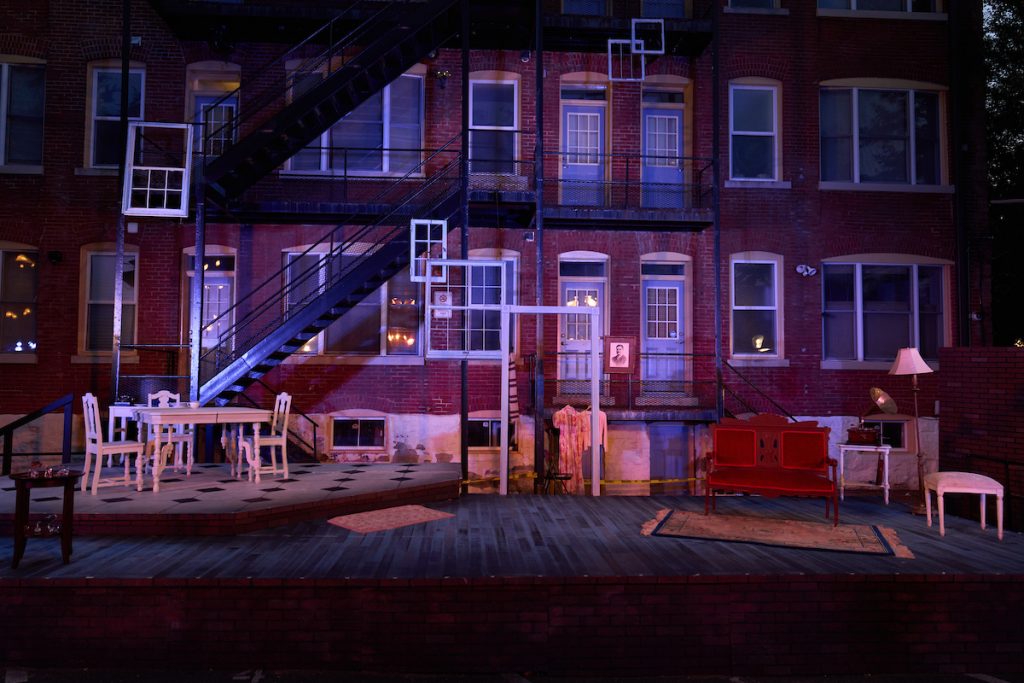
Lynn Venhaus has been reviewing professional theater since 2005, and is a founding member of the St. Louis Theater Circle, established in 2012. A longtime journalist, she has had a continuous byline in St. Louis metropolitan area publications since 1978, earning awards along the way for news and features (and an Illinois Press Association award for reviews before they dropped the category). She has taught writing for the media as an adjunct instructor at three local colleges. A graduate of Illinois State University, she has a mass communications degree with a minor in theater. Among her life achievements are sons Tim and Charlie.

Lynn (Zipfel) Venhaus has had a continuous byline in St. Louis metro region publications since 1978. She writes features and news for Belleville News-Democrat and contributes to St. Louis magazine and other publications.
She is a Rotten Tomatoes-approved film critic, currently reviews films for Webster-Kirkwood Times and KTRS Radio, covers entertainment for PopLifeSTL.com and co-hosts podcast PopLifeSTL.com…Presents.
She is a member of Critics Choice Association, where she serves on the women’s and marketing committees; Alliance of Women Film Journalists; and on the board of the St. Louis Film Critics Association. She is a founding and board member of the St. Louis Theater Circle.
She is retired from teaching journalism/media as an adjunct college instructor.

